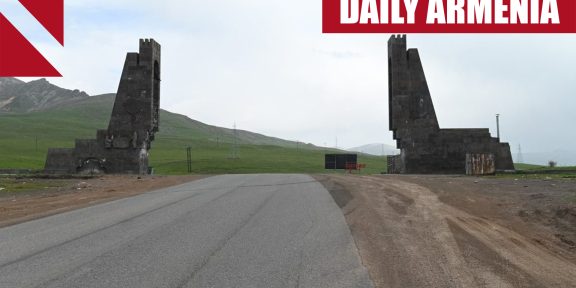 The newspaper Ağani Murutsxi (New Star) resumed publishing this week after publication was suspended last year. It is only the second newspaper written fully in the Laz language. The first was Mçita Murutsxi (Red Star), published in Soviet Abkhazia in 1929.
The newspaper Ağani Murutsxi (New Star) resumed publishing this week after publication was suspended last year. It is only the second newspaper written fully in the Laz language. The first was Mçita Murutsxi (Red Star), published in Soviet Abkhazia in 1929.
Laz is classified by UNESCO’s Atlas of the World’s Languages in Danger as a “critically endangered language”. There are currently less than a few hundred thousand Laz speakers in Turkey and Georgia combined. Many Laz have assimilated or are in the process of assimilation, particularly those who have emigrated to the western parts of Turkey. The Laz language is not supported by the Turkish government. The German-based Lazebura Foundation has petitioned the Turkish government to provide education in the Laz language in schools in their homeland in northwestern Turkey, and to set up a language institute.
The bi-monthly newspaper Ağani Murutsxi aims to cover cultural events, sport and political news along with articles on issues like assimilation, and cartoons. The newspaper also plans to become a periodical in the near future with articles in Turkish and Mingrelian, as well as rotating content in Hamshen Armenian (Hemşince), Georgian, and Pontic Greek.
Mçita Murutsxi, the first Laz newspaper published in 1929, was banned in Turkey. In 1993, a group of Laz started a Laz magazine called Ogni, but the editors were put on trial after six issues for disseminating separatist propaganda. There have been other publications in Laz, but none has lasted longer than a few issues.
Ağani Murutsxi owner İrfan Çağatay, who has also been involved in translations done by the Lazika Publishing Collective, is hoping for community support and for the newspaper to reach all newsstands in the region where Laz is spoken. If that proves not possible, it will be distributed by mail. The bi-monthly newspaper has a contributing team of staff from various cities in Turkey and Germany, where there is a sizable Laz diaspora.
In its next (November-December) issue, the newspaper plans to run articles on its predecessor “Mçita Murutsxi” and on Soviet-era Laz leader İskenderi Tzitaşi. Another Soviet-era Laz cultural figure is Helimişi Xasani, who tried to preserve the Laz language and culture after emigrating to Soviet Georgia.
Currently, the issue of minority languages is at the forefront of Turkish politics. The PKK has halted the withdrawal of its troops because the Turkish government has not met some of its demands. The PKK and the Kurdish Peace and Democracy Party (BDP) are demanding that Kurdish be designated in the new constitution as a language to be taught in primary schools. On September 12, Turkish Deputy Prime Minister Bülent Arınç acknowledged the Kurds’ complaints, but said the issue is not on the agenda.
















